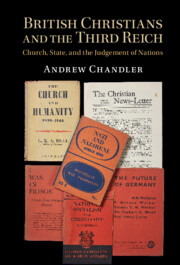Book contents
- British Christians and the Third Reich
- British Christians and the Third Reich
- Copyright page
- Dedication
- Contents
- Acknowledgements
- Introduction
- Part I An Inhabited Landscape
- Part II The German National Revolution, 1933–1934
- Part III Resisting a Rapprochement, 1935–1937
- Part IV Crisis, 1938–1939
- Part V The Onslaught, 1939–1943
- Part VI A Gathering Judgement, 1944–1949
- Endings and Legacies
- Bibliography
- Index
Part V - The Onslaught, 1939–1943
Published online by Cambridge University Press: 05 May 2022
- British Christians and the Third Reich
- British Christians and the Third Reich
- Copyright page
- Dedication
- Contents
- Acknowledgements
- Introduction
- Part I An Inhabited Landscape
- Part II The German National Revolution, 1933–1934
- Part III Resisting a Rapprochement, 1935–1937
- Part IV Crisis, 1938–1939
- Part V The Onslaught, 1939–1943
- Part VI A Gathering Judgement, 1944–1949
- Endings and Legacies
- Bibliography
- Index
Summary
Bishops of the Church of England were often found to be members of a variety of clubs and lent their names to many societies. Among his many other commitments Bishop Bell was a member of the Grotius Society. Established in the context of the Great War in 1915, the society represented a meeting of minds from a variety of spheres, academic, public and diplomatic, and was a place in which questions of international law, war and peace might be discussed in depth and detail. The participation of a bishop in such conversations would have been welcomed by the members of such a body, not least because they would have regarded their subject not merely as a theatre for experts and technicians but as a matter of public principle, interest and concern. Hugo Grotius himself had been the arguable father of international law, who had argued for the claims of natural justice and taught that the morality of war might be discerned not only in its causes but in the manner in which it was conducted. He had also been a writer of tolerant theology, whose Truth of the Christian Religion had once found an appreciative audience in Britain. In such ideas, and in the conviction that a man of faith might also be one who judged the affairs of the nations, there was much for Bell to think his own. What did the Christian faith, the premises of natural justice and the principles of international law now demand?
- Type
- Chapter
- Information
- British Christians and the Third ReichChurch, State, and the Judgement of Nations, pp. 271 - 326Publisher: Cambridge University PressPrint publication year: 2022

